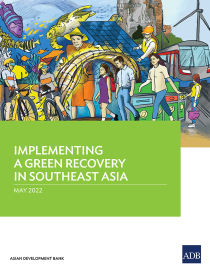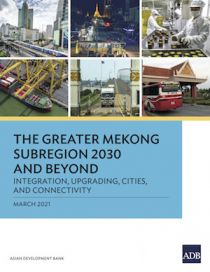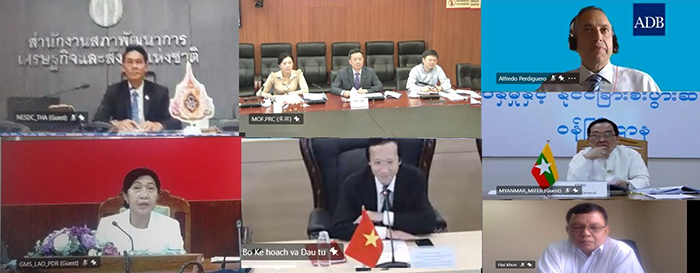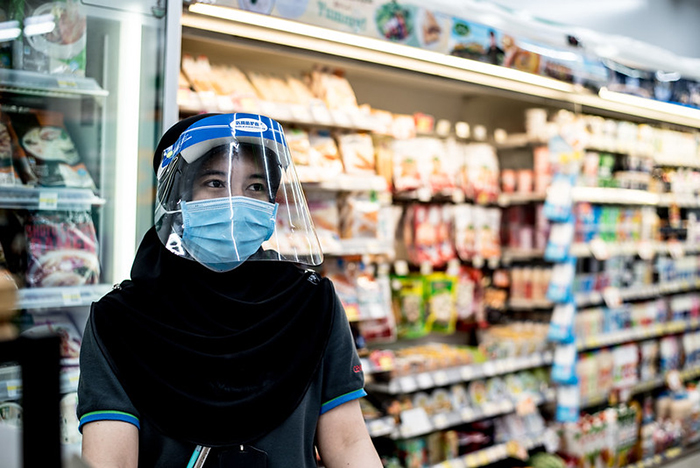
Implementing a Green Recovery in Southeast Asia
This report explains why Southeast Asian countries need to design pandemic recovery policies that hit both ambitious socioeconomic and environmental goals.

This report explains why Southeast Asian countries need to design pandemic recovery policies that hit both ambitious socioeconomic and environmental goals.

This publication provides an analysis of key challenges and opportunities for the Greater Mekong Subregion (GMS) to realize its development goals by 2030 and beyond.
The Asian Development Bank (ADB) and its partners will collectively zero in on strategies and policy responses that countries can adopt to lay the groundwork for post-COVID-19 recovery at the upcoming Southeast Asia Development Symposium (SEADS) Innovation through Collaboration: Planning for Inclusive Post-COVID-19 Recovery.
Cambodia, Lao PDR, and Viet Nam (CLV) Leaders expressed their firm commitment to strengthen the CLV Development Triangle Area (DTA) in order to accelerate economic growth, alleviate poverty, and promote socio-cultural progress in the subregion. At the 11th CLV Summit held online on 9 December, they adopted a Joint Declaration that provides a foundation for the subregion’s socio-economic development plan until 2030 and the Tourism Development Plan. They also adopted the Development Plan for Sustainable Rubber Industry.
Leaders of Cambodia, Lao PDR, Myanmar, Thailand, and Viet Nam adopted the Phnom Penh declaration at the 9th Ayeyawady-Chao Phraya-Mekong Economic Cooperation Strategy (ACMECS) Summit held on 9 December. The declaration emphasizes post-pandemic socio-economic recovery and preparation for future crises and challenges through public health cooperation and enhanced supply chains. ACMECS leaders stressed the importance of vaccine multilateralism to ensure equitable and safe access to coronavirus disease (COVID-19) vaccines.
The 24th GMS Ministerial Conference (MC-24) was held on 4 November 2020 with the theme “Pave the way to a more integrated, inclusive, sustainable and prosperous GMS.”
The 10th Mekong-Republic of Korea (RoK) Foreign Ministers’ Meeting was held on 28 September online, with the participation of Cambodia, Lao PDR, Myanmar, Thailand, Vietnam, and the RoK. The meeting highlighted achievements in cooperation on infrastructure, information technology, education, agriculture, environmental protection, and water resources management, and adopted the action plan for 2021-2025.

Top row, left to right: Dr. Danucha Pichayanan, Deputy Secretary General, Office of the National Economic and Social Development Council (Thailand); Mr. Liu Weihua, Deputy Director General, Department of International Economic and Financial Cooperation, Ministry of Finance (PRC); Mr. Alfredo Perdiguero, Director, SERC, ADB. Middle row: Mr. Than Aung Kyaw, Director General, FERD, Ministry of Investment and Foreign Economic Relations (Myanmar). Bottom row, left to right: Ms. Sisomboun Ounavong, Director General, Department of International Cooperation, Ministry of Planning and Investment (Lao PDR); Dr. Pham Hoang Mai, Director General, Foreign Economic Relations Department, Ministry of Planning and Investment (Viet Nam); and H.E. Mr. Ros Seilava, Secretary of State, Ministry of Economy and Finance (Cambodia)
A GMS Senior Officials Meeting (SOM) was held on 11 September 2020 via web-based conferencing to review (i) proposed key GMS strategic planning documents and knowledge products, which includes GMS COVID-19 response initiatives and the new long-term strategy for the GMS program, and (ii) preparations for upcoming GMS events—the 11th Economic Corridors Forum (ECF-11), the 24th GMS Ministerial Conference (MC-24), and the 7th GMS Summit (Summit-7).

Areenee Jasiti is a store assistant manager in Thailand where convenience stores have remained open, despite COVID-19. Convenience stores are one of Thailand's lifelines. Photo: UN Women/Ploy Phutpheng (CC BY-NC-ND 2.0)
The Asian Development Bank (ADB) is providing a $1.5 billion loan to support the Government of Thailand’s response to the coronavirus disease (COVID-19) pandemic.
In the popular imagination, the coronavirus disease (COVID-19) pandemic has been a boon for the natural world. With more than a third of the global population under some level of lockdown, we’ve delighted to see skies burst back into blueness and wild animals venturing into urban neighborhoods. It’s been easy to convince ourselves that wildlife and the environment have flourished. The truth, however, isn’t so reassuring. The pandemic has created an increase in poaching, animal trafficking, illegal fishing and other environmental crimes.